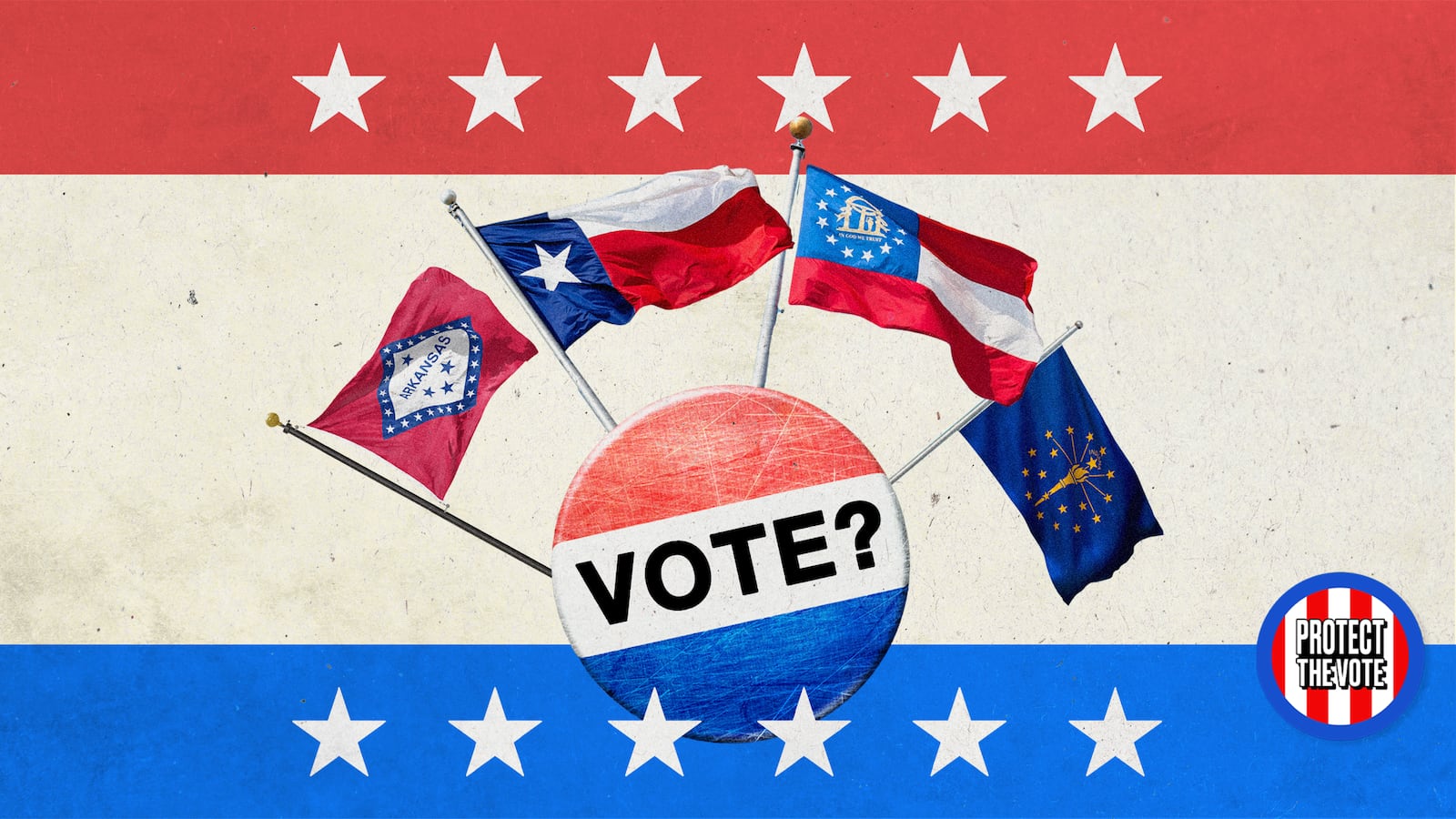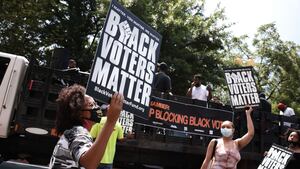In March, Pulaski County Circuit Judge Wendell Griffen had a blunt assessment of four new voting laws in Arkansas.
He said the new laws—two of which would make it harder to vote by mail, in addition to adding new ID requirements for provisional ballots—violated the state’s constitution and placed an undue burden on voters. For a moment, Arkansas voting rights activists could breathe a sigh of relief.
But their peace didn’t last long.
Arkansas Attorney General Leslie Rutledge swiftly appealed the ruling. And on April 4, the Arkansas Supreme Court upheld the laws. In a state that had the lowest voter turnout in the nation during the 2020 election, advocates are concerned these policies will only make participation worse.
And Arkansas isn’t alone.
A number of states that have passed new voting restrictions in the past year—including Arkansas, Georgia, Alabama, and Indiana—have primaries this month. Their outcomes will serve as the first big test of the impact of new voting restrictions enacted following the 2020 election and former President Trump’s election hysteria.

Pulaski County Clerk Terri Hollingsworth, who serves as the county’s elections administrator in Arkansas, says executing the changes in her state has been “somewhat of a nightmare.” She’s worried about a new rule requiring voters’ signatures on their absentee ballots to match what the state has on file—fearing that signatures might have naturally changed over the years.
“We’re not handwriting experts,” she told The Daily Beast.
And informing voters about the changes, including a change in deadlines for returning absentee ballots, has forced her to roll out a public messaging campaign ahead of the May 24 primary. “It’s really difficult too because the clerk’s office never really had a budget to do public service announcements… Now, we’re having to look at maybe adjusting our budget so we can add public relations,” Hollingsworth said.
In Georgia, new laws added ID requirements for voting by mail, shortened the window to apply for an absentee ballot, reduced access to absentee-ballot drop boxes, and—seeming to draw the most ire online—banned water from being passed out to voters in long lines.
Alabama restricted access to absentee ballots, too. Indiana enacted an ID requirement for applying for absentee voting online that has to match what the state has on file, which advocates worry could turn away folks who feel uncomfortable sharing private information on the internet—as well as those who didn’t have those numbers when they registered to vote.
Indiana, which holds its primary on May 3, has a strict set of requirements for who can vote by mail, limiting it mostly to people who are disabled, elderly, or without any transportation to the polls. By adding extra requirements to the process, voting-rights activists fear Hoosiers will give up on the option. For folks that can’t physically cast their ballots in person, that could mean giving up on voting altogether.
“It takes us in the wrong direction. It’s another way to confuse voters to put additional obstacles in their way,” Common Cause Indiana executive director Julia Vaughn told The Daily Beast.
In Arkansas, Hollingsworth is certain the new laws will cause some confusion, adding that voters “may not know that there’s a change.” And Arkansans aren’t given much of a grace period to fix their ballots if something goes wrong, Hollingworth said.
While these states will be the first test on a grand scale of the impact of new, restrictive voting laws—they won't be the first.
So far, Texas is the only state to have held a 2022 primary, which occurred on March 1. The state also had a new voting law requiring voters to provide a driver’s license number or a social security number on their absentee-ballot applications and actual ballots—and for that ID information to match what the state has on file.
That change, among others, left elections administrators scrambling to understand the new rules and how to effectively communicate them to voters. Confusion surrounding the new law, in addition to mismatched information for some, caused 12 percent of mail ballots to be rejected based on the new rule.
Texas will also be having primary runoffs on May 24 for races where no candidate hit 50 percent in the last round of voting. Advocates say the March 1 primary helped pinpoint some initial problem areas with the new laws—and that elections officials have more guidance this time around. But they’re not expecting the problems to be solved by the second round of primaries.
“Do I have confidence that the state is going to do a better job? No, I do not,” Charlie Bonner, communications director for the voting-rights group MOVE Texas, told The Daily Beast. He argued the intention of the law was to make it more difficult to vote—and in that sense, the law is working as it should.
The common concern among elections administrators and organizers in these states with new voting laws is that individuals could break the laws unintentionally. In Arkansas, for instance, one of the four new laws bans voters from standing within 100 feet of a polling place unless they’re actively waiting to vote. Hollingsworth questioned what could happen to individuals who are merely striking up small talk on their way out—or bump into someone they know while passing by.
Elections workers are also expected to be under intense scrutiny in enforcing the new rules, which aren’t always simple to understand.
But organizers in these states caution the primary is just a trial run for what impacts these new laws will have in the general elections this November. Republican state leadership will likely be the enforcement mechanism for most of these news policies—but most of the GOP will have its own primaries underway, potentially pushing them to stay out of Democratic primaries or down-ballot races, said Cliff Albright, confounder of the Georgia voting-rights group Black Voters Matter.
Albright said Georgia’s 2021 elections that occurred after the new laws went into effect, which were mostly for local seats, allowed organizers to pinpoint areas of confusion for voters. He said they’ve figured out workarounds and are “cautiously optimistic” headed into the primary season.
But Albright cautioned that those 2021 impacts aren’t “what we’re going to see this year.”
During the general election, Republicans will have more at stake, and more of a reason to be involved in hammering down these new elections rules. Georgia’s 2022 general election is expected to be a hotbed of political activity, with Republicans desperately hoping to win back the state after a blue wave swept both Senate seats and the presidential vote in the state last election.
“Whatever we’re going to see in these primaries is not going to be the full extent of the problems,” he added.
In 2022, state legislatures have also continued to consider potential new changes to elections laws, with Republican lawmakers and voters still questioning the legitimacy of the 2020 election, though there was no evidence of widespread fraud. Bonner argues that any effort to continue enacting new voting restrictions—especially after seeing the impact in Texas and the potential for disenfranchisement in these upcoming states—is an affront on individuals’ right to vote.
“When we are not legislating in reality, real people get hurt,” he said.










